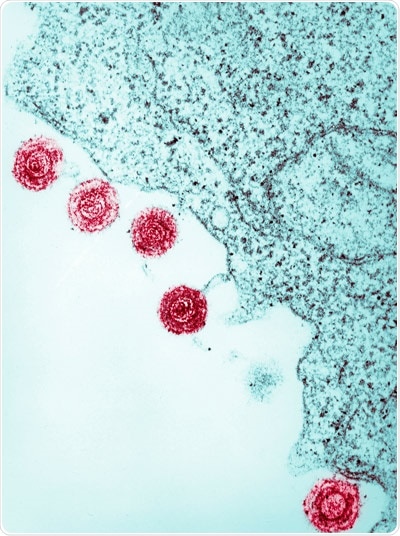Three geneticists from RIKEN identified previously undetected snippets of genetic material from viruses that were hidden in human DNA. The techniques they created for this discovery are vital for determining when the viral genetic material entered the human genome and to identify if it can give rise to differences between people.

A false-colored electron micrograph showing human herpesviruses 6 (HHV6; red circles) infecting a cell. RIKEN researchers have discovered new heritable structural variants derived from HHV6 in human genomes. Image Credit: Callista Images/Cultura/Science Photo Library.
Around 8% of the human genome can be traced back to retroviruses—viruses that reverse the normal order of genetic transcription, possessing an RNA genome that is reverse-transcribed into DNA and later inserted into the genome of the host cell. The most infamous retrovirus is the human immunodeficiency virus (HIV).
Retroviruses cause devastating effects on human health; however, the viral genetic material inserted into human genomes can offer beneficial functions. For instance, retroviral proteins expressed in the placenta allow humans and other mammals to give birth to live offspring instead of eggs.
During the course of human evolution, our ancestors acquired many virus-derived sequences, some of which impart useful functions. I used to think that viruses were menaces, but some of their genetic sequences are essential for human development.”
Shohei Kojima, RIKEN Center for Integrative Medical Sciences
For more than 20 years, scientists have uncovered more information about the retroviral genetic sequences in the human genome, in addition to viral-origin sequences derived from non-retroviruses. However, it is unclear how much of these sequences differ between individuals and whether variants could create different human characteristics.
Kojima, Anselmo Kamada, and Nicholas Parrish from RIKEN Center for Integrative Medical Sciences (IMS) analyzed virus-derived variations in 3,332 individuals from various populations employing bioinformatics tools specifically designed for the task.
The researchers found that viruses are responsible for unexpected structural variations in the human genome. They also identified rare variants in the germline that can be traced back to human herpesvirus 6.
However, not all the viral genetic material the researchers identified had ancient origins. The trio found that some commonly utilized cell lines are infected by viruses.
We think these sequences are likely caused by infection of the subject who donated their blood for human genetics research. Strangely, the viruses don’t usually infect B cells, which were used to make the cell lines we used, and so we don’t fully understand how those viruses infected the cells.”
Nicholas Parrish, RIKEN Center for Integrative Medical Sciences
The researchers aspire to inspect the possible functions of the sequences they have discovered. Certain research works suggest the association between viral genetic sequences and a higher risk of certain diseases, says Parrish.
If that’s true, how and why are they maintained in the human population? We want to see if they provide some benefit in addition to the cost.”
Nicholas Parrish, RIKEN Center for Integrative Medical Sciences
Source:
Journal reference:
Kojima, S., et al. (2021) Virus-derived variation in diverse human genomes. PLOS Genetics. doi.org/10.1371/journal.pgen.1009324.